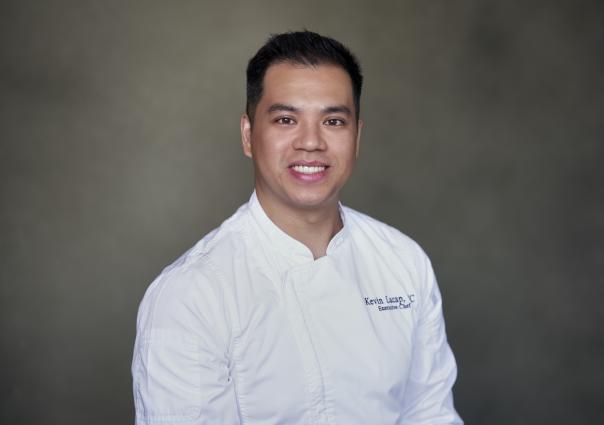
Kevin Lecap is the executive chef at the Pan-American Life Building in New Orleans. It’s a storied position for someone who’s only 33, and he arrived at it unconventionally.
After a stint at culinary school in San Francisco, Lecap decided to seek further education and did so through Soil2Service, which offers a certification through the Detroit Institute of Gastronomy. He completed online courses and an apprenticeship, where he moved through the ranks of a restaurant company for two years.
Lecap isn’t alone. Today’s culinary students in America are being trained for a variety of careers, and many of them are learning their skills through community colleges and non-traditional courses like Soil2Service’s. These cost a fraction of a big-name culinary school — and many of the latter are permanently closing, anyway.
Ashley Holian is the programme director for the Culinary Arts programme at Scottsdale Community College in Arizona.
The course has 60 students. They can take a one-year certificate programme for an entry-level job in a kitchen, or a two-year associate degree programme for a higher position.
The Culinary Arts Institute at Mott Community College in Flint, Michigan, has a brand new facility that includes several culinary and baking laboratories, a garde manger classroom, a chocolates and confections laboratory, a meat and fish fabrication room, and a temperature-controlled wine cellar and dry-aged meat room.
Students can take certificate programmes or an associate degree programme. There are around 300 students ‘but we have the capacity to double that’, says Matthew Cooper, culinary arts programme coordinator.
Soil2Service has 15 students and is continuing to grow, says executive director Jeremy Abbey. He established the programme because he and the other instructors, when they worked at culinary schools, kept hearing that their graduates had knowledge but were having difficulty functioning on the job.
Soil2Service students can take a one-year certificate programme or a two-year sous chef certificate. Both include online classes and quizzes and time working in the industry (2,000 hours per year, though they’re also being paid). The two-year programme costs US$18,000 (£14,100), which includes everything from knives to books. Because it’s a non-profit it also has many scholarships that help drop that cost down.
Course constitution
Coursework at Scottsdale Community College includes dining room operations (how to operate a front-of-house); garde manger, nutrition, culinary maths and food safety. On the practical side, classes include baking, hot foods and working in the campus restaurant.
“They learn soft skills, hard skills, the mentality and humbleness to get into this field”, says Holian. “We strive to let them know that culinary school isn’t the be-all and end-all and they won’t get big salaries out of the gate.”
The courses also include a lot of guest speakers from different culinary careers to open students’ eyes to what’s out there. The guest speakers also teach some classes ‘to shake things up’, says Holian, and the college puts on a type of speed dating event so students can chat, briefly, one-on-one with people in the industry.
The student base is varied, with around 40% coming directly from high school; 20% having a mid-life crisis and looking to transition their career; 10% of students simply want to learn to cook; and the remainder is a mixed bag, Holian says.
Mott Community College students also come straight from high school, but also come back after working in the culinary industry, to enable them to progress their careers. Some employers even send their staff and pay for the training. Scholarships are available for students, too, but overall, a course like this, ‘is going to cost as low as you can really get for community college programmes’, Cooper says. “It’s appealing because students don’t have as much debt and they’re going to have a job before they graduate.”
At Mott, students learn everything from what it takes to start a catering business — writing menus, costing them out, etc. — to management and learning how to deal with customers.
Soil2Service’s students learn skills ranging from proper station set-up to lamb fabrication and pastry skills in the sous chef programme.
Work experience
Instead of doing work experience, students at Scottsdale Community College work in the campus restaurant The Artichoke Grill for 24 weeks — eight weeks in front-of-house operations, eight weeks in savoury foods, and eight weeks in baking/pastry.
Teachers are there to manage, advise and assess, says Holian, ‘but they’re hands-off’. When the restaurant is open, on Wednesdays and Thursdays, 15 students work in the front of house and 30 in the back. They’re making and serving a three-course meal and a la carte dishes.
Mott students get some of their work experience on-campus at The Coffee Beanery and an upscale casual restaurant. In the latter they learn three classes: a professional cookery class, a baking class, and an a la carte dining class. Students who work at The Coffee Beanery are learning, but not as part of their coursework, and are paid.
But the school also offers a co-operative programme, through which students work 200 hours in the industry. “We recommend that they go to work where they aspire to work”, says Cooper. This could be private clubs, catering companies, senior care facilities, hospitals or traditional restaurants.
Job dream vs. job reality
Students may begin their culinary education aspiring to work in a Michelin-star restaurant but the reality is very different. Holian encourages them to stage in a variety of places they’d like to work in.
A lot of her students go into local hotels because the college has partnerships; others go into independent restaurants, food trucks, senior living facilities, hospitals, and several have set up their own businesses, such as selling baked goods online.
Mott and Soil2Service students go on to work as cooks, chefs, and managers in professional kitchens, retirement facilities, and resorts.